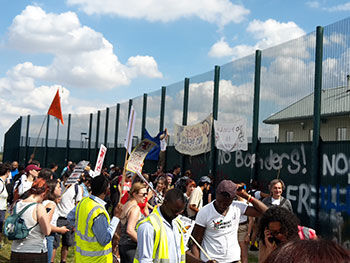University News Last updated 14 July 2016

Academics in the UK and Italy have launched a research project which aims to better understand how the European refugee crisis is constructed through media representations and how this has shaped responses from institutions and the general public.
The 18-month project – titled Conflict, Memory, Displacement – is being led by Dr Kirsten Forkert at Birmingham City University, and will also study how experiences of conflict are remembered and memorialised by displaced people, and the role this can play in peace-building and conflict resolution.
The perspective of refugees themselves will be crucial to the project, as their voices are generally silenced or under-represented in the mainstream debate. For example, research carried out last year by Migrant Voice showed that only 12 per cent of news articles in the UK about immigration actually quoted a migrant.
As two countries that have experienced mistrust towards European institutions and mainstream politics, intertwined with debates around migration in relations to conflict, the UK and Italy provide robust examples for comparison in this study.
Both countries have also seen a simultaneous rise in citizen-led initiatives to assist refugees, often organised through social media, and the researchers will be investigating the notion of international responsibility during a time when media rhetoric is often very different from the reality.
Dr Kirsten Forkert, Lecturer in Media, Birmingham City University said:
“Our research project was inspired by a crucial humanitarian shift which occurred last year. The summer began in the UK with a series of newspaper headlines and speeches calling asylum seekers ‘swarms’, ‘floods’ and ‘marauders’, with controversial ‘Sun’ columnist Katie Hopkins even comparing them to ‘cockroaches’.
“At the same time, in the UK, donations of clothing to Calais were organised fairly spontaneously on social media – which seemed at odds with the rhetoric coming from the Government and the mainstream press.
The project will take an interdisciplinary approach to studying the refugee crisis, applying arts methodologies to sociological issues and concerns. This includes mapping media discourses used to construct the refugee crisis in the UK and Italy, analysing citizen initiatives – both in solidarity with refugees and those which express hostility towards them – and surveying social media responses to the crisis.
The team will also carry out critical memory and discussion workshops with people displaced by conflict. The researchers want to know whether the ways that refugees remember and memorialise the situations they have left behind can help the public to better understand the refugee crisis and other such international conflicts.
Dr Federico Oliveri, Research Fellow of the Sciences for Peace Interdisciplinary Centre at University of Pisa, added:
“Italy is a particularly suitable case study for this research, as the country has become a living laboratory for emergency-based management of European borders in the last decade.
“The problem is not that we see too few or too much suffering bodies in the media, but that we see too many bodies that are an object of speech without themselves having a chance to speak. While images become the lot of poor and perturbing multitudes, discourses remain the privilege of the few.
“This is why we are confident that giving a voice to refugees will help to spread critical awareness, encouraging more people to join solidarity actions and engage for a radical change in migration and international policies, at a national and European level.”
Material gathered from this research will be disseminated to academics, policymakers and activists, as well as displayed in an online exhibition. Furthermore, working with Nottingham Contemporary, London’s Implicated Theatre and Bologna-based Cantieri Meticci, the team will develop an ethnodrama script, which will help dramatise the findings from the research.
Find out more about the progress of the research team on the Conflict, Memory Displacement blog.
Funding for the project has come from the Arts & Humanities Research Council (AHRC) and the Economic and Social Research Council (ESRC), who have issued a joint call for Interdisciplinary Innovation Awards on Conflict and International Development.